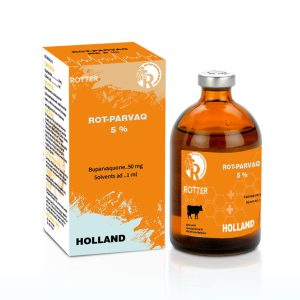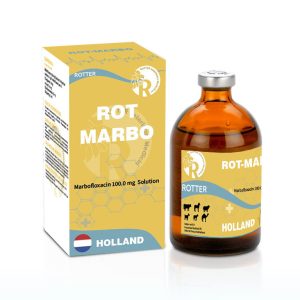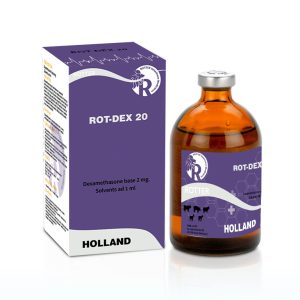
Penstrep-400 LA Rott
Contains per ml:
Procaine penicillin G……………………….. 100 000 IU.
Benzathine penicillin G……………………. 100 000 IU.
Dihydrostreptomycin sulphate…………. 200 mg.
Solvents ad…………………………………….. 1 ml.
Procaine penicillin G……………………….. 100 000 IU.
Benzathine penicillin G……………………. 100 000 IU.
Dihydrostreptomycin sulphate…………. 200 mg.
Solvents ad…………………………………….. 1 ml.
Arthritis, mastitis and gastrointestinal, respiratory and urinary tract infections caused by
penicillin and dihydrostreptomycin sensitive micro-organisms, like Campylobacter, Clostridium,
Corynebacterium, E. coli, Erysipelothrix, Haemophilus, Klebsiella, Listeria, Pasteurella,
Salmonella, Staphylococcus and Streptococcus spp.
penicillin and dihydrostreptomycin sensitive micro-organisms, like Campylobacter, Clostridium,
Corynebacterium, E. coli, Erysipelothrix, Haemophilus, Klebsiella, Listeria, Pasteurella,
Salmonella, Staphylococcus and Streptococcus spp.
The combination of penicillin G and dihydrostreptomycin acts additive and in some cases
synergistic. Procaine penicillin G and benzathine penicillin G are small-spectrum penicillins with
a bactericidal action against mainly Gram-positive bacteria like Clostridium, Corynebacterium,
Erysipelothrix, Listeria, penicillinase-negative Staphylococcus and Streptococcus spp.
Dihydrostreptomycin is an aminoglycoside with a bactericidal action against mainly Gram-negative
bacteria like E. coli, Campylobacter, Klebsiella, Haemophilus, Pasteurella and Salmonella spp.
synergistic. Procaine penicillin G and benzathine penicillin G are small-spectrum penicillins with
a bactericidal action against mainly Gram-positive bacteria like Clostridium, Corynebacterium,
Erysipelothrix, Listeria, penicillinase-negative Staphylococcus and Streptococcus spp.
Dihydrostreptomycin is an aminoglycoside with a bactericidal action against mainly Gram-negative
bacteria like E. coli, Campylobacter, Klebsiella, Haemophilus, Pasteurella and Salmonella spp.
Hypersensitivity to penicillins, procaine and/or aminoglycosides.
Administration to animals with a seriously impaired renal function.
Concurrent administration of tetracyclines, chloramphenicol, macrolides and lincosamides.
Administration to animals with a seriously impaired renal function.
Concurrent administration of tetracyclines, chloramphenicol, macrolides and lincosamides.
For intramuscular administration:
General: 1 ml per 10 kg body weight every 72 hours.
When recommended by professional opinion, it can be administrated every 48 hours.
Shake well before use and do not administer more than 20 ml in cattle, more than 10 ml in swine
and more than 5 ml in calves, sheep and goats per injection site.
General: 1 ml per 10 kg body weight every 72 hours.
When recommended by professional opinion, it can be administrated every 48 hours.
Shake well before use and do not administer more than 20 ml in cattle, more than 10 ml in swine
and more than 5 ml in calves, sheep and goats per injection site.
– For kidney: 45 days.
– For meat: 30 days.
– For milk: 5 days.
– For meat: 30 days.
– For milk: 5 days.
Administration of therapeutic dosages of procaine penicillin G can result in abortion in sows.
Ototoxity, neurotoxity or nephrotoxicity.
Hypersensitivity reactions.
Ototoxity, neurotoxity or nephrotoxicity.
Hypersensitivity reactions.
Vial of 50 and 100 ml.



